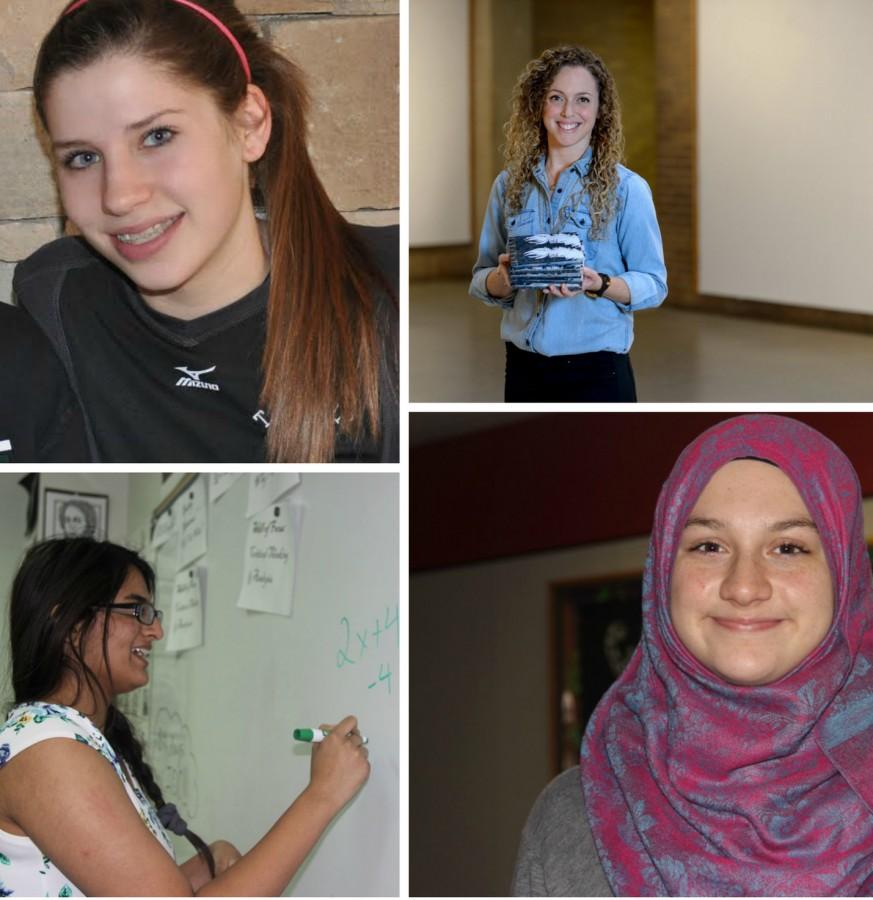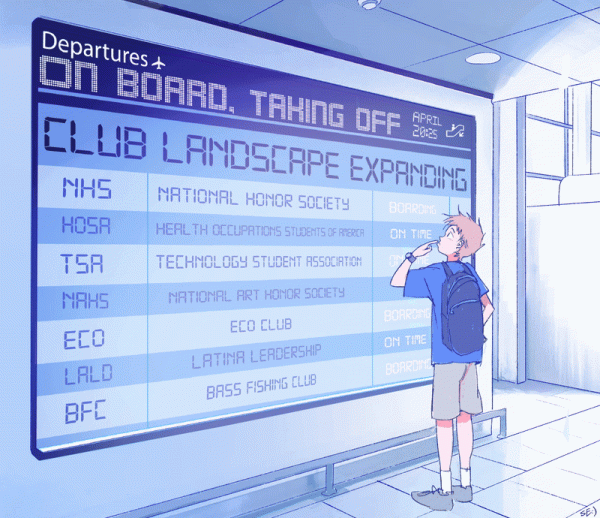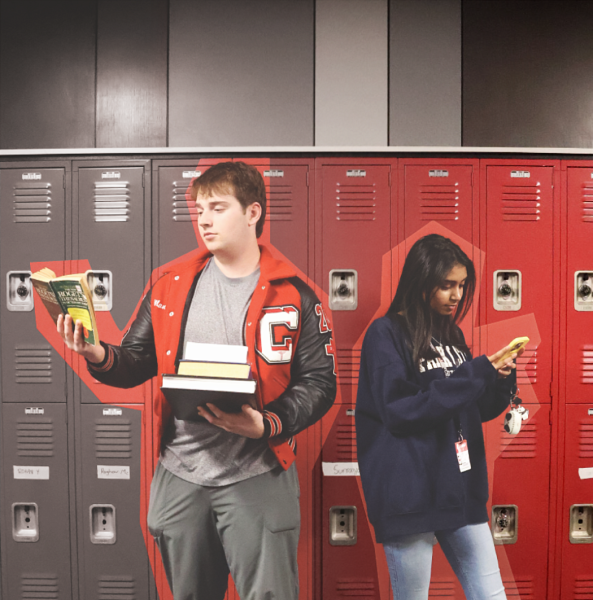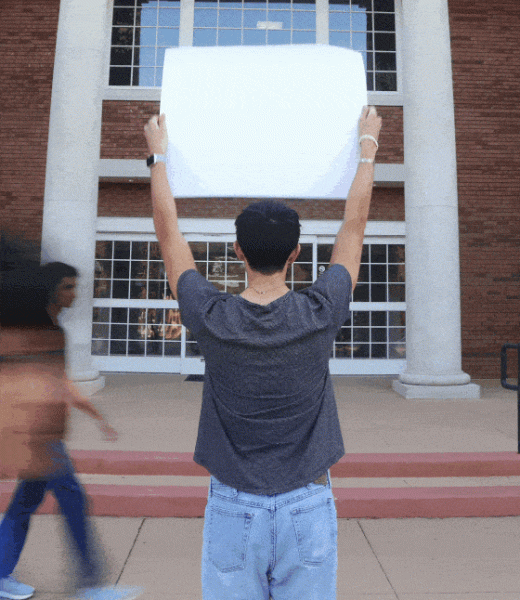The good news is here at last: An ode to happier headlines
Top left: Taylor Storch, Top right: Joy Ellis, Bottom left: Saman Hemani, Bottom right: Amerah Taleb
A Syrian man awoke to a sunrise of barrel bombs and dead neighbors yesterday. A little girl from North Texas was waiting for her mother to come home with gingerbread men and stockings last Christmas Eve, but instead daddy came with tears and told her the spinning monsters took mommy away.
The old father planned for his son to visit that weekend, a few days after the television set told him quietly that a couple shot 21 at the same holiday party in San Bernardino, Calif. The Parisian, once with family, still has nowhere to go no matter where they give her a home.
The papers waited too, for someone to tell them that there is good in this world, that they could go to a home knocking not to herald of a family member killed, but of flights rescued and lost children found.
The good, though, it was always there-
in a Dallas school girl who took a trip to Kenya, in a mother who lost her daughter, in a woman who turned three generations of suffering into fabric and words, and in two religions that voided their differences:
Coppell High School, Coppell, Texas: The Aga Khan Development Network unbinds the fetters of disadvantaged communities in 30 countries across Asia and Africa, carrying change over to the lives of millions without the means to escape flooded homes, or, as young children, grow into healthy adults.
CHS senior Saman Hemani visits schools in Dallas, where she helps beautify gardens and start local clubs for the students.
Part of the Aga Khan Foundation (AKF), a sister agency to the Development Network, Hemani serves as a culture officer for the Foundation’s Youth Ambassador group. With the aim of “thinking globally, acting locally,” they work with two low income schools in Plano – Barron Elementary and Forman Elementary – to uplift underprivileged kids from poverty.
With books? No. With money? Perhaps more.
Currently, Hemani is organizing an art competition for seven participating high schools in the Dallas area, themed “breaking the cycle of poverty – one voice, one vision.”, to inspire students from lower socioeconomic classes to use their talents and express what poverty has meant to them.
“What we do isn’t as impactful as the AKF,” Hemani said. “But it’s the small things we do, it’s the one person that you motivate through that art competition.”
Last summer, Hemani ventured a little farther from Plano – a distance of almost 10,000 miles to Kenya, to assist physically disabled children who can not raise their hands or talk properly learn like any other child.
“I realized, that as an individual, I probably don’t have the ability to truly affect the world as I think I would be able to,” Hemani said. “But it’s that once you do those little things, you make connections with others, and once you create a pool of people that all want to make a difference, then you can make a difference.”
Coppell, Texas: Todd and Tara Storch are the parents of four: Peyton, Ryan, Taylor and Taylor’s Gift. Taylor is no longer here with them. She passed away in March 2010 after an innocent ski trip took a turn for the worse, leaving her parents broken as any would become.
After Taylor’s accident on the ski slopes, a nurse had come to the parents and asked, “Would you be willing to give Taylor’s organs?” Taylor’s parents agreed in respite from an inconceivable horror and on went Taylor to give life after her own was gone.
The Storch family drove back from Colorado to their Coppell home and 13-year-old Taylor’s absence. It was tragedy, carved out whole and emptying all else. But Mrs. Storch recalls when, bit by bit, the family made their own light in something that would have trapped most in the dark.
“I remember my husband looking at me and saying, ‘Our reaction to this is going to be so important. Our reaction is either going to cave us in or we are going to try to find the good,’” Mrs. Storch said.
And the good, they found, had already become the heart, pancreas, kidneys and corneas of five lives, the five recipients of Taylor’s organs.
After researching and finding that only an appalling two percent of Texas residents were organ donors at the time, Mr. and Mrs. Storch decided to bring their daughter’s unimaginable gift to all else in the community who could now have another chance to live. It became Taylor’s Gift.
Today, Taylor’s Gift is the only foundation in the United States. that gives financial assistance to the individual people who make countless lives possible – the ones who sign the papers and pledge parts of their being to another. With the motto “Outlive yourself,” the foundation promotes organ registration and has, in effect, gifted thousands across America with new organs – and it all began with a family who lost a girl, a cherished sister and daughter.
But the Storches were able to see it as so much more.
“Organ donation is not about death – people mistake that,” Mrs. Storch said. “It’s about life. We share all these stories with people to show them the importance of this, the life-saving gift that it is.”
Denton, Texas/Iraq: It was a project in her Latin American art history class, and it was three generations of Kurdish women in Iraq fleeing from the untellable horrors of Saddam Hussein, and most recently, ISIS.
But Joy Ellis told their story.
A photography student at North Texas University, Ellis had been assigned to create art inspired by pieces she was currently studying for her Latin American art history class at the university’s College of Visual Arts. So Ellis contacted her sister- an activist who lives amongst the Kurdish people in Iraq.
“I wanted to tell the other side of the story we hear in the news,” Ellis said. “We hear a lot about men in Iraq but we hear very little about women. I wanted to acknowledge and validate those women and their story.”
Ellis, in Denton, and her sister, in Iraq, collaborated to create a handmade book that would record the stories of three Kurdish women – a grandmother, a mother, and a teenaged daughter – in lace, brocade and vellum paper. The pages of the book narrate the stories in the spoken words of the women, who are part of a race that has been starved, hunted, choked with mustard gas, killed and refused their own country by Turkey, Iran, Syria and Iraq.
“They were literally running for their lives,” Ellis said. “[The women’s story,] it’s heart-wrenching, very hopeful, and beautiful at the same time.”
Ellis was amazed, in particular, by the story of the teenaged daughter. She was frightened by ISIS, but still studied for her math and economics exams while a war, of which her own father was a part of, waged through the peephole of her backdoor.
“I wanted to empower her in any way I could to make her feel like she could do and be whatever she wants to be, and make her realize that she is a very important part of society,” Ellis said.
Her sister tells Ellis that the family, especially the young girl, was very excited about having their story told by an American.
“I think every single little bit helps, even if it’s not a huge step. I’m not changing legislation or anything in Iraq,” Ellis said. “I hope people realize that the women in the story are people just like they are, although their lives may be different.”
Cameroon, Africa: Friday-the Mosques call out to their devotees. The Muslim men and women of the town stir from their homes and line up in front of the Masjid’s courtyard, removing their shoes and separately stepping onto the interior mosaic, right foot first.
Another faith besides Islam circles the mosque.
The Christians stand patrol, machetes and arrows in hand. They guard the praying Muslims from a terror that has killed 8,000 people of the Christians’ own faith – all members from the Church of Brethren, of which 70 percent has been destroyed in the last few years by the terrorists. These deaths are the work of Boko Haram, a Nigerian Islamic extremist group that on Jan. 13 of this year, killed 10 and injured dozens of Muslims praying in a mosque in the town of Kolofata.
The Muslims and Christians of Cameroon have begun to protect each other from these rampant attacks as part of a recent security plan with the local vigilance committees that is being extended to the entire far north region of Cameroon.
Amerah Taleb, a junior at CHS, is Muslim, and has previously lived in Egypt. There, in 2011, she saw Christians and Muslims holding hands and protecting each other during the January 25 revolution.
“It’s great,” Taleb said. “It’s just really positive to see that people are seeing that there are Muslims that don’t believe in this radical ideology and that they haven’t done anything wrong. It’s about time that these Muslims who know the real Islam are in the news.”
On Sundays, the Muslims keep vigilance while hymns are sung and the word of God is read in Church, so that prayers may not be broken by deadly attacks from the feared terrorists.
Maria Farrell is an assistant to the pastor at the Holy Trinity Catholic Church. The Church is in Dallas, not Cameroon, and she knows all too well of times and places where communities of Muslims and Christians haven’t gotten along as well.
.“Finally,” Farrell said. “People in the world are treating each other with the respect that’s deserved. Everyone has the right to worship the way they would like to worship. If people everywhere would deal with each other in this mature and respectful manner, there would be a lot less conflict and violence in the world. This should be our goal.”
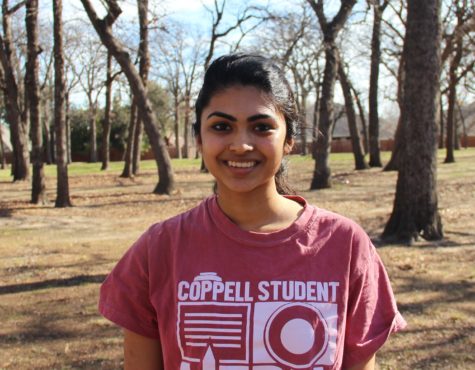
Meha Srivastav writes, or rather, passionately consumes the wee hours of night writing for The Sidekick. When not writing for The Sidekick, she can be...



